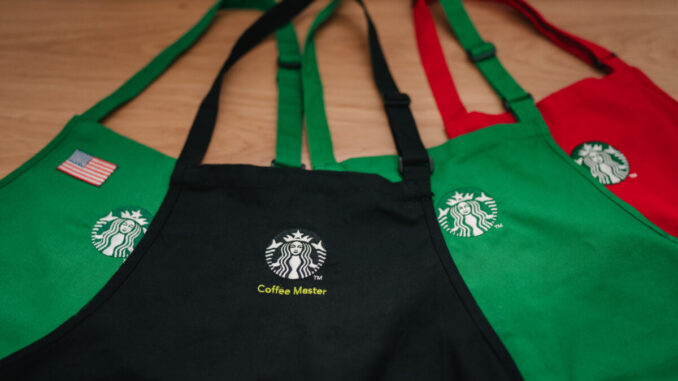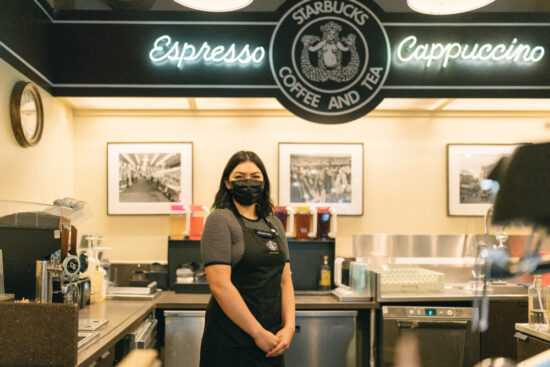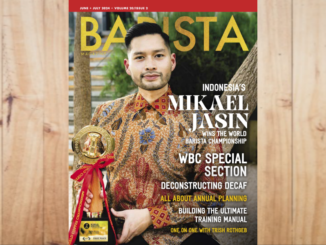
The Starbucks Coffee Academy marks the return of a previous educational platform for baristas at the iconic coffee chain.
BY YKER VALERIO
SPECIAL TO BARISTA MAGAZINE ONLINE
Photos courtesy of Starbucks
In a competitive market like coffee, it takes more than just great products to keep customers coming back—it’s also essential to create a unique customer experience. That’s where Starbucks Coffee Academy and the Coffee Master Program come in—they help employees learn the skills they need to give customers the best possible experience.
Furthermore, learning is a lifelong pursuit; it’s what keeps people curious and engaged in the world around them. In this spirit, Starbucks’ Coffee Master Program is returning for employees in North America.
To learn more about the program and the academy behind it, we reached out to Starbucks.

Learning and Engagement: The Coffee Masters Program Double Impact
Starbucks refers to its employees as partners. According to the company, this wording reflects the importance of shared success between employees and Starbucks.
Earlier this year, Howard Schultz returned to the CEO position. In his first 30 days on the job, he and other senior leaders met with partners in collaborative sessions to create a shared vision and address crucial topics for the future.
Across different conversations, some topics became more notable than others, and among the important ones was the importance of learning and engagement for personal and business growth.
In this regard, one of the ideas that came forward was the return of the Coffee Master Program and the black apron. The latter serves as the most visible learning credential and recognition for Starbucks partners who complete the program, becoming both a symbol of excellence and a learning credential.
In addition to the black apron, Coffee Masters will have the chance to be selected for a trip to Hacienda Alsacia in Costa Rica, the Starbucks coffee farm. This way, Starbucks isn’t only promoting a higher standard for coffee knowledge among its partners, but also offering a more engaging working and learning experience.
The Importance of the Black Apron
Although Starbucks’ aprons have adopted different colors for different purposes and occasions, the black apron was a popular recognition among partners. It’s a powerful incentive to finish the Starbucks Coffee Academy courses, which lead to the Coffee Master Program award.
The Starbucks Coffee Academy is an online platform open to partners and the general public. The academy covers a wide range of topics starting with where coffee comes from, providing partners with a rich overview of the coffee value chain.
Furthermore, the academy offers specialized content, including agriculture and post-harvest processing, as well as barista skills. To develop the program’s content, Starbucks has trusted subject matter experts like agronomists, quality specialists, and green coffee buyers to ensure the content is of the highest quality.
As participants advance, the platform has a modular approach that goes from the basics to more complex topics. It’s also flexible enough to let users dip in and out, allowing them to learn at their own pace.

Coffee as a Career?
The return of the black apron and the Coffee Master Program serves the shared goals of Starbucks and its partners, as they look forward to a future where both can grow and prosper. In context, the initiative by this coffee giant shouldn’t be taken as an isolated action, but as part of a significant trend toward employee investment in coffee businesses.
In an earlier interview with Major Cohen, author of Coffee for Dummies and a former senior executive at Starbucks, he said that coffee would become a career in its own right in the near future.
Following a similar line of thought, Chahan Yeretzian, the head of the Coffee Excellence Center at the Zurich University of Applied Sciences, expects that coffee training and knowledge quality will keep improving over the next few years. In a previous interview, Chaham said that the quality of coffee education and science is achieving new standards of complexity and professionalism.
Indeed, many people will still take coffee jobs as side gigs to sustain their higher education expenses. But, as more sophisticated coffee training offerings sprout, it’s worth reflecting upon the future of coffee careers in and outside coffee shops.
ABOUT THE AUTHOR
Yker Valerio (he/him) is a freelance content creator. After more than 10 years of working as a management consultant, he started the blog Bon Vivant Caffè to share his passion for specialty coffee.




